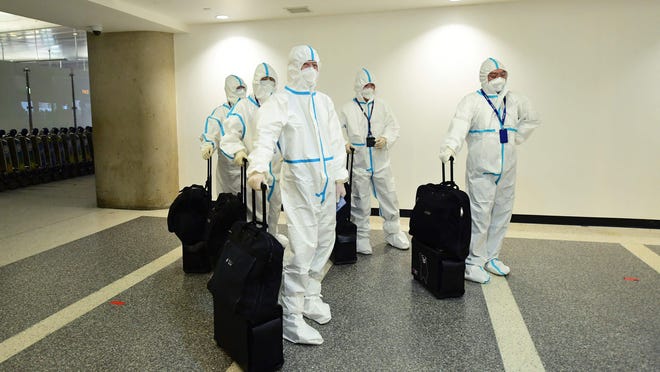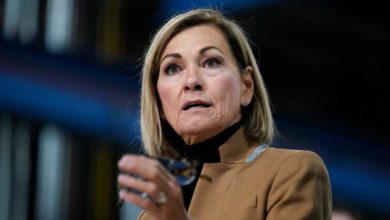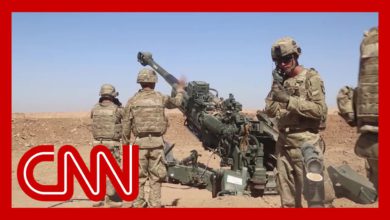
Planning to fly into the U.S. soon? Be prepared for more stringent testing requirements.
The Centers for Disease Control and Prevention is shortening the testing window all international air travelers have to take a pre-departure coronavirus test from three days to one. Previously, only unvaccinated travelers had to take a test no more than one day before travel.
The reduced time frame aims to "provide less opportunity to develop an infection with the omicron variant prior to arrival in the United States," according to the updated CDC order.
U.S. airlines have been asked to collect contact-tracing information for inbound international travelers and send it to the CDC "upon request" since Nov. 8, when the country adopted a new set of international travel restrictions.
The information collected includes names, addresses, phone numbers, emails and dates of birth.
The new rules go into effect Monday at 12:01 a.m. ET and affect all air passengers 2 years and older flying into the U.S. from a foreign county, regardless of vaccination status or nationality.
Also in the news:
►A Belgian zoo said that two hippopotamuses in its care are in isolation after testing positive for COVID, possibly the first time ever such animals have caught the disease.
►Delaware saw the highest number of new daily COVID-19 cases since January last week. Recently, state officials warned residents to be cautious again as the state sees an uptick in cases and the country reels from the emergence of the omicron variant.
📈 Today's numbers: The U.S. has recorded more than 49 million confirmed COVID-19 cases and more than 788,000 deaths, according to Johns Hopkins University data. Global totals: More than 265.6 million cases and 5.2 million deaths. More than 198 million Americans – roughly 59.9% of the population – are fully vaccinated, according to the CDC.
📘 What we're reading: For the past two years, humanity has been adrift in a sea of COVID-19. Now nations are waiting to see if the omicron variant of the coronavirus is just another swell in that sea or a monster wave that will crash down with devastating effect. Coming to terms with this ongoing turbulence will require nimble reactions.
Keep refreshing this page for the latest news. Want more? Sign up for USA TODAY's Coronavirus Watch free newsletter to receive updates directly to your inbox and join our Facebook group.
Johnson & Johnson vaccine works well as mix-and-match booster, study finds
A new study found that the Johnson & Johnson COVID-19 vaccine serves as an effective booster on top of full vaccination from the Pfizer vaccine.
A J&J booster, administered six months after two doses of the Pfizer vaccine, increased antibody and T-cell responses, according to the study, demonstrating potential benefits of mix-and-match boosters.
“There is early evidence to suggest that a mix-and-match boosting approach may provide individuals with different immune responses against COVID-19 than a homologous boosting approach,” said Dan Barouch, director of the center for virology and vaccine research at the Beth Israel Deaconess Medical Center.
The director of the Centers for Disease Control and Prevention signed off on mix-and-match COVID-19 booster shots in October.
The organization recently changed its guidance on booster shots in response to the new highly-contagious omicron variant, now recommending all adults ages 18 and older get a booster shot.
— Celina Tebor, USA TODAY
Massachusetts hospitals fire 200 employees who refused vaccination
UMass Memorial Health fired more than 200 caregivers who refused to get vaccinated for COVID-19, CEO and President Dr. Eric Dickson said Friday.
“Sadly, we did terminate over 200 people for not getting vaccinated,” Dickson confirmed Friday in an interview. “We could have used them because we need everyone we have right now.”
UMass Memorial Health’s roughly 15,000 employees faced a Nov. 1 deadline to get vaccinated or to receive an exemption, after which they were placed on unpaid leave if they did not get a shot.
If employees did not get a shot before Dec. 1, they were let go.
“It was for the safety of other staff members and patients that we had to do this,” spokesperson Debora Spano said.
She added that fewer than 1%, or about 100 people, were given exemptions for religious or medical reasons.
The hospital network has seen its intensive care unit beds fill quickly following COVID-19 surges after the Thanksgiving holiday: UMass Memorial Medical Center had 70 people waiting for beds at the University Campus last Friday — eight of whom needed intensive care beds.
— Cyrus Moulton, Telegram & Gazette
Source link








